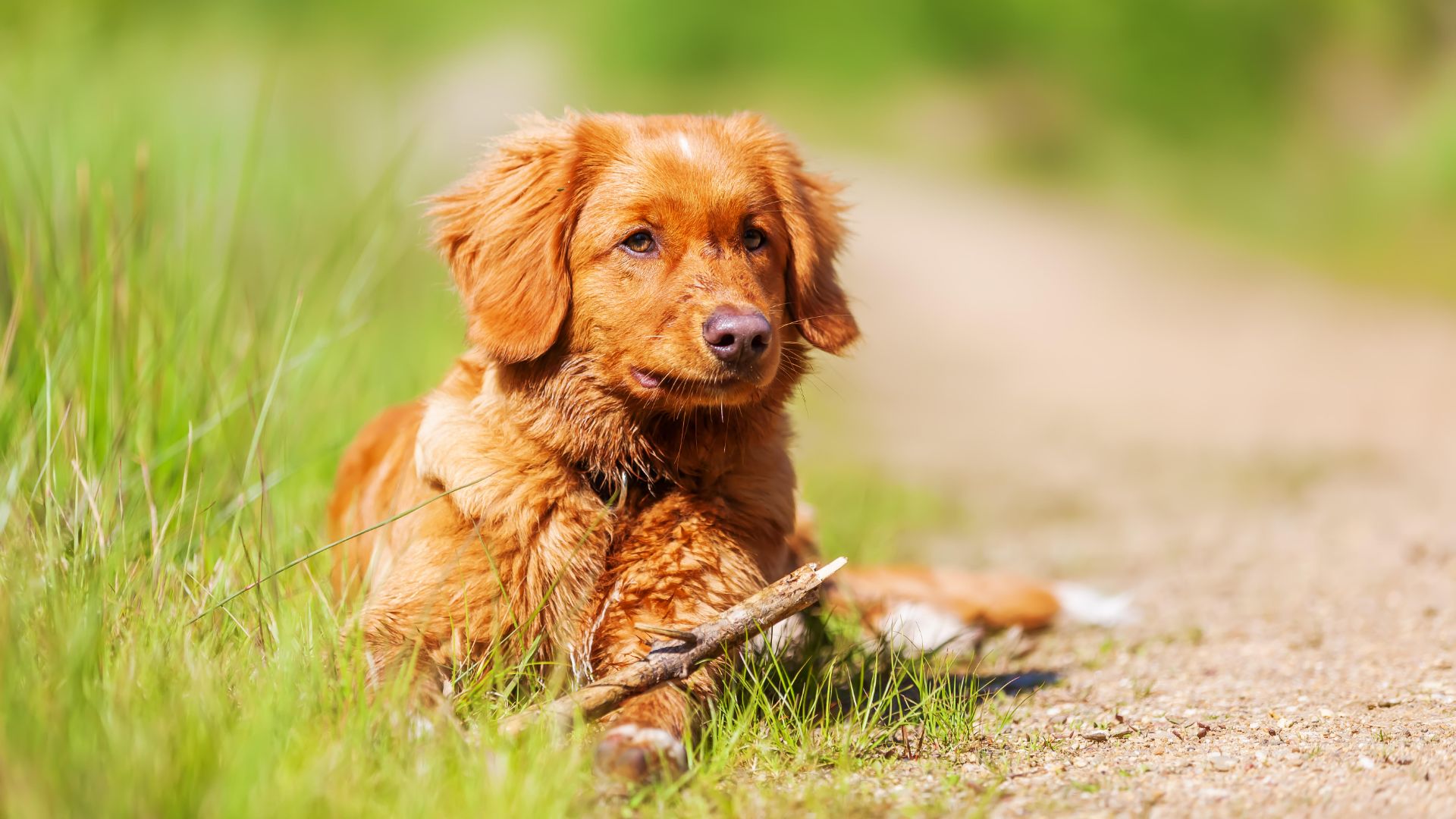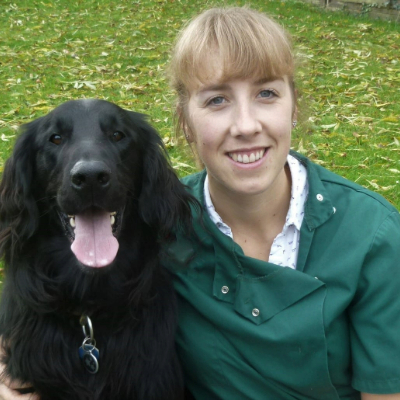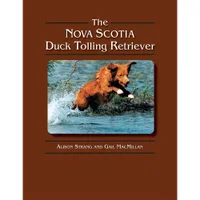Nova Scotia Duck Tolling Retrievers are also known as ‘red tornados’ – here’s what you need to know
Tollers aren’t for the faint-hearted, but this playful, energetic breed makes a fun-loving family companion


Life expectancy: 12–14 years
Size: 18–21 inches (male); 17–20 inches (female)
Coat: Medium
Temperament: Affectionate, outgoing, intelligent, eager to please
Exercise needs: Up to one hour a day
Origin: Canada
Simply known as a “Toller” to fans of the breed, the Nova Scotia Duck Tolling Retriever hails from Canada, originally as a hunting dog. They were used to lure ducks and other waterfowl into range of the guns before retrieving fallen birds. It is said that their playful antics on the waterline would pique the interest of ducks and geese, drawing them in to investigate.
Tollers are the smallest of the retriever breeds, but their trademark crimson coats makes them easy to spot in a line-up. They are playful and full of energy, yet they make affectionate companions. The American Kennel Club refers to these dogs as “red tornados”, and it’s easy to see why!
They can be a challenge to train, so short, fun sessions are the way to go. Keeping their brains occupied is just as important, too, so many owners partake in sports like agility or flyball. And if you live near water, you’re bound to have a happy Toller as these dogs love to swim.
If you think a Nova Scotia Duck Tolling Retriever could be for you, read on to find out more about the breed, with expert advice from vet Dr Rebecca MacMillan.
Do Nova Scotia Duck Tolling Retrievers shed?
Yes, due to their waterproof double coat, Tollers are known for their shedding. Regular brushing can help keep on top of loose hairs, and happily this breed is relatively easy to groom.
“Their medium-length coat just needs regular brushing to keep things looking neat,” says Dr MacMillan, adding, “It’s important not to forget the feathery bits behind their ears as these can become matted.”
As with all dogs, regular teeth brushing and nail trimming is also recommended.
Get the best advice, tips and top tech for your beloved Pets
Are Nova Scotia Duck Tolling Retrievers good family dogs?
“Tollers can make great family dogs,” confirms Dr MacMillan. “Their compact medium size and friendly nature make them a good choice for active households.”
However, Dr Macmillan warns, “They are energetic dogs, so they may be best suited to older families who have the time to meet their exercise needs.”
They generally need around an hour of exercise a day, depending on their age and health status, and it’s important that this involves mental stimulation, too. Anything relating to retrieving or water will keep a Toller happy, and you can get the whole family involved here.
They’re always keen for an adventure and a play, so an active, outdoorsy family is the perfect fit for this breed.

Are Nova Scotia Duck Tolling Retrievers cuddly?
Yes, as well as being patient and loving with children, most Tollers love cuddling up with their owners, provided all their needs are met. If they don’t receive enough physical or mental stimulation they may become independent when out and about and destructive when in the home.
Do Nova Scotia Duck Tolling Retrievers bark a lot?
“Tollers are not known for barking a lot, but each dog is an individual,” explains Dr MacMillan. “Early socialisation will help to reduce the risk of excessive vocalisation.
“Also, making sure your dog has plenty of mental and physical stimulation will help to make them more settled in the house,” she adds.
They may well bark to alert their owners to strangers outside, or bark and whine when they are excited or overstimulated, but they are not known as being loud or “yappy” dogs.

Wisdom Panel Breed Discovery DNA Kit | Amazon
Not sure exactly what breed your dog is? This kit screens for 365+ breeds – because knowing every detail about your dog helps you understand how best to care for them.
Nova Scotia Duck Tolling Retriever common health problems
“The Nova Scotia Duck Tolling Retriever is considered to be a generally healthy breed,” reassures Dr MacMillan. “However, there are a few inherited health problems that they are susceptible to.”
Like many pedigree breeds, Tollers can suffer from elbow and hip dysplasia.
“Developmental joint abnormalities like these can lead to joint pain, mobility issues, and early-onset arthritis,” explains Dr MacMillan.
She adds, “Autoimmune thyroiditis can affect this breed, leading to symptoms of hypothyroidism such as lethargy, weight gain and skin issues.”
Another endocrine (hormone) issue that can affect Tollers is hypoadrenocorticism, which is also known as Addison’s disease.
“This causes a decrease in cortisol production, which can have serious effects on the body, such as lethargy, vomiting, and collapse,” says Dr MacMillan.
She advises potential owners to “choose your puppy from a breeder that has carried out all of the recommended health screens”.
Should I buy a Nova Scotia Duck Tolling Retriever?
These intelligent, playful dogs are easy to fall in love with, but it’s important to make sure they’re a good fit for your family before you commit to a puppy. They’re a lively, energetic breed that loves nothing more than an outdoors adventure with their owners, and they make great companions to those who are able to meet their needs.
Families with an interest in dog sports, such as agility, dock diving and flyball, are a great fit for this active little retriever, and previous experience with gundogs will give you an advantage when it comes to training.
If you’re confident you can meet their needs, this playful “red tornado” could be a great addition to your family and a loyal companion to boot.
The Nova Scotia Duck Tolling Retriever | Amazon
A complete dog breed book on the Nova Scotia Duck Tolling Retriever, covering history of the breed, a description of tolling, selection, care, training, and activities in which Tollers excel.
Read next: Chesapeake Bay Retriever breed profile

Rebecca is a veterinary surgeon who graduated in 2009 from the Royal Veterinary College in London. She has a wealth of experience in first opinion small animal practice, having done a mixture of day-to-day routine work, on-call emergency duties and managerial roles over the years. Rebecca enjoys medicine in particular and she is proud to have recently achieved a BSAVA postgraduate certificate in small animal medicine (with commendation).
She writes on various feline and canine topics, including behavior, nutrition, and health. Outside of work and writing she enjoys walking her own dog, spending time with her young family and baking!
Edited by Georgia Guerin.
This feature was last updated in July 2025 by Victoria Jones.

Victoria Jones is a freelance writer at PetsRadar. She has a decade of experience working on equestrian and countryside magazines – including on PetsRadar's sister title Horse & Hound for five years. She has done a variety of different jobs over the years, including sub-editing, writing, video editing and marketing.
Victoria is currently dog mum to Maple, a six-year-old German Shorthaired Pointer with endless energy. She also helps to look after her husband's marine fish tank, with her favourite inhabitants being the two clown fish, Michel and Francois.
She has previously owned cats and horses as well – at one point having a menagerie of two dogs, two cats and two horses, which kept her very busy indeed.


